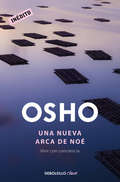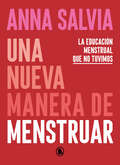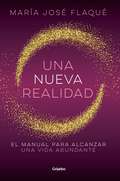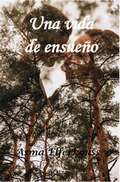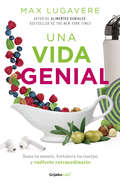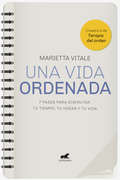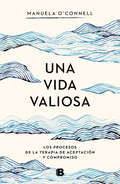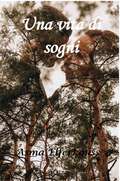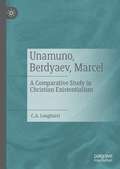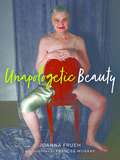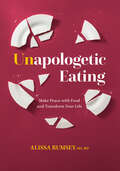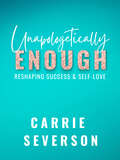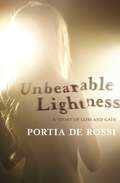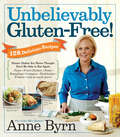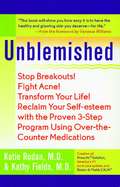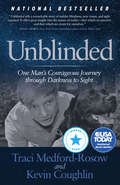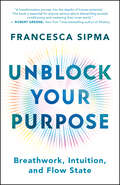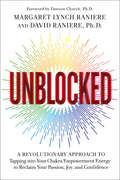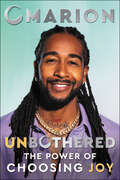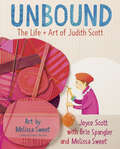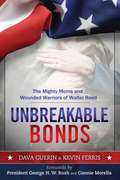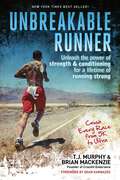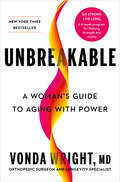- Table View
- List View
Una nueva arca de Noé: Vivir con conciencia
by OshoAnte una situación de crisis generalizada, Osho nos propone construir un «arca de Noé de la conciencia» para liberarnos de aquellos valores caducos que no nos dejan avanzar. Parece que día tras día la Humanidad se acerque cada vez más a lo que se ha denominado «la gran extinción»: el cambio climático se está acelerando a un ritmo alarmante; la globalización, por otro lado, no ha cumplido sus promesas de acercar a la gente y crear una sociedad más abierta, inteligente e inclusiva, todo lo contrario; y las instituciones públicas, que deberían velar por un mundo más justo, no hacen más que agravar esta situación de crisis. La presente edición está formada por una serie de charlas en las que Osho propone la creación de una suerte de «arca de Noé de la conciencia», que nos permitirá superar todos aquellos valores antiguos y caducos que nos han llevado a esta situación, y ser más conscientes de la realidad tal y como es. Osho también nos enseña que el único momento que podemos vivir es el ahora, solo así hallaremos la fuerza necesaria para superar estos tiempos tan difíciles.
Una nueva manera de menstruar: Conociendo y respetando tu cuerpo y tus necesidades menstruales
by Anna SalviaEl libro que desdibuja los tabús de la regla y construye un camino hacia una nueva cultura menstrual. Por Anna Salvia, psicóloga en educación y salud sexual, y autora de Viaje al ciclo menstrual. La regla es una función fisiológica que no debería provocar malestar ni dolor per se, igual que no lo hace ninguna otra función fisiológica. Sin embargo, hemos recibido una educación menstrual que nos ha enseñado a vivir la menstruación desde el malestar y la incomodidad. En este libro descubrirás otra forma de experimentar la menstruación. Obtendrás los conocimientos y herramientas clave para entender el funcionamiento de tu cuerpo, respetar tus ciclos y poder vivir la menstruación desde el bienestar.
Una nueva realidad: El manual para alcanzar una vida abundante
by Maria José Flaqué MollLa autora del best seller Soy una mujer holística regresa con el libro que todos sus seguidores estaban esperando: un manual práctico para vivir una vida en abundancia. Más de 10,000 ejemplares vendidos de Soy una mujer holística y una inmensa comunidad de seguidoras alrededor del mundo convierten a María José en una de las influencers de espiritualidad y bienestar más exitosas de los últimos tiempos. ¿Crees que la realidad que vives es la que realmente te mereces? O por el contrario, ¿sientes que vives en modo automático tus relaciones, tu trabajo y tu diario vivir? Ha llegado el momento de los cambios, de abrirte al mundo y de recibir toda la abundancia que el universo ha preparado para ti. Y lo mejor, es más sencillo de lo que creías. . Muchas personas viven en modo automático: se despiertan, van al trabajo y terminan el día sintiéndose cansados y ansiosos. Nada sale como esperan y eso los lleva a preguntarse: ¿esto era todo? La mala noticia es que los cambios no llegan si no los deseas realmente; la buena, es que puedes vivir en abundancia y está al alcance de todos. Una nueva realidad es posible y este libro es la herramienta indispensable para crear, pensar y construir la vida que sueñas. Con la ayuda de ejercicios, meditaciones y el estilo único de María José Flaqué que ha cautivado a miles de lectores alrededor del mundo, descubrirás qué es lo que realmente deseas, aprenderás a vivir con los miedos e incertidumbres normales de la vida cotidiana y descubrirás que es posible sentirte amada, plena y satisfecha cuando decidas empezar a disfrutar una vida próspera, abundante con todo lo que mereces.
Una vida de ensueño
by Asma ElferkoussEscribiéndole una carta a su hija, una madre intenta prodigar consejos y recomendaciones para permitir a su progenitura tener las claves a la mano para vivir una vida plena, "una vida de ensueño".
Una vida genial: Sana tu mente, fortalece tu cuerpo y vuélvete extraordinario
by Max LugavereUn programa de 21 días capaz de restaurar tu cerebro y tu cuerpo para combatir la fatiga, la ansiedad y la depresión. Desde Alimentos geniales, Max Lugavere definió un plan de nutrición enfocado en la salud cerebral, y ahora, en Una vida genial, lleva su propuesta de estilo de vida un paso más allá, ahondando en las investigaciones internacionales sobre biología circadiana, psicología, prevención de la demencia, optimización cognitiva y fisiología del ejercicio. A través de un programa de 21 días, Lugavere nos muestra paso a paso cómo integrar decisiones saludables en nuestra rutina para desintoxicar, desestresar y fortalecer nuestro cuerpo. Además, nos explica cómo mantener la salud de nuestro cerebro -incluyendo las funciones cognitivas y el bienestar emocional- a través del buen funcionamiento de nuestros sistemas digestivo, endocrino, cardiovascular y nervioso. Una vida genial es el antídoto para esa sensación de cansancio, inflamación y malestar generalizado que nos afecta diariamente. «Una vida genial esclarece el hecho de que la degeneración física es todo menos una casualidad. Nosotros somos los arquitectos del destino de nuestra salud a partir de las decisiones que tomamos. Estas páginas presentan las mejores recomendaciones extraídas de nuestras investigaciones médicas más respetables, para empoderar al lector con herramientas que afecten de manera positiva su futuro.» DAVID PERLMUTTER, autor de Cerebro de pan, bestseller #1 de The New York Times La crítica ha dicho: «Laura Baeza, en este bello libro, nos conduce a una inquietante trama, donde prevalecen terribles preguntas, ¿quién es en realidad la gente que queremos?, ¿la conocemos realmente? Y la pregunta más terrible de todas, ¿sabemos en qué país vivimos? Laura consigue lo que desea todo escritor, mover de sitio al lector, hacerlo voltear hacia donde nunca imaginó. Los invito a subirse a este viaje por los misterios de la condición humana, no se arrepentirán.» Guillermo Arriaga «Niebla ardiente lleva al lector por un viaje emocional y una montaña rusa de nostalgia. Es una novela escrita con prosa filigrana sobre la ausencia, la pérdida y lo que significa “hogar”.» Kevin Gerry Dunn «Laura Baeza ha escrito un sorprendente juego de espejos entre una mujer y su hermana: una novela cargada de nostalgia y ternura acerca de los lazos familiares que nos enredan más allá de lo que somos capaces de aceptar.» Ave Barrera «Laura Baeza nos sumerge en un universo femenino donde los propios sentimientos y las convenciones sociales son cuestionados, donde el océano Atlántico funge como barrera entre un doloroso pasado y un presente en apariencia en calma, pero en el que la tragedia se abre espacio.» Lola Ancira
Una vida ordenada: 7 pasos para disfrutar tu tiempo, tu hogar y tu vida
by Marietta VitaleUna vida ordenada, el nuevo libro de la interior planner Marietta Vitale, tiene como objetivo sumar la organización personal y hacer foco en nuestra primera casa, es decir, nuestro cuerpo. ¿Cómo hacer para que nos rindan las 24 horas del día, que parecen no alcanzar nunca para todo lo que debemos -y queremos- hacer? El fin de este libro es articular el orden de los espacios con la organización personal. Lograr un día a día más simple es posible. ¡Basta de "no tengo tiempo para nada"! En siete pasos, Marietta Vitale propone aprovechar el tiempo de la mejor manera. La autora ha ayudado a centenares de personas a cambiar su vida a partir del orden. Sin embargo, a veces otros aspectos de la vida siguen desorganizados. Para estar en equilibrio, este es el momento de centrarte en tus tiempos y tu cuerpo. La creadora de Terapia del orden ahora va un paso más allá con una guía pensada para que, a través del orden, hagas todo lo que querés, maximizando tu bienestar y el de quienes te rodean.
Una vida valiosa: Los procesos de la terapia de aceptación y compromiso
by Manuela O'ConnellCon un estilo cercano, a través de prácticas inspiradoras, preguntas que desestructuran y ejercicios que propician el autodescubrimiento, Una vida valiosa nos convoca a mirar la vida de frente, amarla tal como es y vivirla en plenitud y libertad. Lejos de los dogmas y las promesas de felicidad, Una vida valiosa nos invita a conmover los cimientos más profundos de lo que llamamos "nuestra vida", "nuestros deseos", "nuestra personalidad", para redescubrirlos en su sentido más genuino y vital. A partir de la terapia de aceptación y compromiso (ACT, por sus siglas en inglés), modelo que pertenece a la tradición de las terapias cognitivo-conductuales, Manuela O'Connell guía al lector y lo acompaña en un recorrido fascinante y revelador. No es un camino fácil. Emprenderlo implica desaprender las respuestas usuales con que solemos enfrentar el dolor, el malestar, la adversidad. También significa desarrollar una mirada nueva, más abierta, más flexible, sobre nosotros mismos y lo que nos rodea. Y esa perspectiva nos devuelve la capacidad de "registrar y elegir cómo relacionarnos con lo que nos pasa. Además, y sobre todo, nos provee de una serie de aprendizajes a través de diferentes procesos para ayudarnos a vivir una vida con sentido". Con un estilo cercano y poético, por medio de prácticas inspiradoras, preguntas que desestructuran y ejercicios que propician el autodescubrimiento, Una vida valiosa nos convoca a mirar la vida de frente, amarla tal como es y vivirla en plenitud y libertad.
Una vita di sogni
by Asma ElferkoussLe parole preziose di una madre alla propria figlia, attraverso una lettera il cui testo esprime tutto il suo amore con una serie di indicazioni per un futuro felice e appagante, ma anche costruttivo all’interno della società in cu si vive.
Unamuno, Berdyaev, Marcel: A Comparative Study in Christian Existentialism
by C. A. LonghurstThis book seeks to examine the mutual interplay between existentialism and Christian belief as seen through the work of three existentialist thinkers who were also committed Christians - a Spaniard (Miguel de Unamuno), a Russian (Nikolai Berdyaev), and a Frenchman (Gabriel Marcel). They are compared with each other and with leading non-religious existentialists. The major themes studied include reason, freedom, the self, belief, hope, love, suffering, and immortality.
Unapologetic Beauty
by Joanna FruehA startlingly powerful collaboration reimagines female beautyWhat is beauty without pain? Compromise is what our culture offers women: cinching, pinching, cutting, shaving, scraping, starving, and, of course, lifting and separating, all in service of one sharply circumscribed model purported to be pleasing—but not to most, if any, women. This extraordinary book reimagines beauty at its most provocative and fetishized locus: the female breast. Artist, writer, and scholar Joanna Frueh scrutinizes ideals of beauty and sensuality, often motivated by her experiences with breast cancer. Frances Murray, her friend and collaborator for more than thirty years, documents Frueh&’s journey of unapologetic beauty in a series of intimate, dazzlingly original photographs before and after her bilateral mastectomy and chemotherapy. Reflecting with insight, directness, and humor—and with contributions from a breast surgeon, an oncologist, and artists and scholars who have had breast cancer—Frueh arrives at a new, liberating view of beauty and of the sensual pleasure found in transformative self-acceptance. Central to this reckoning is her documentation and critique of the notion of hyperbeauty (the flash of flesh appeal, hyperthin, hyperfeminine, hyperbosomy, hypersexy, and hyperyoung sold at the global 24/7 beauty bazaar) and her playful, inventive presentation of tools for remaking minds and hearts disfigured by self-denying ideals.In its bracing critique, passionate argument, and compelling narrative—all illustrative of its own unapologetic beauty—this collaboration is a performance of startling power, stirring to consider and a pleasure to behold.
Unapologetic Eating: Make Peace With Food And Transform Your Life
by Alissa RumseyMost women have spent time dieting and trying to change themselves in order to fit into a mold—and a body—that is deemed socially acceptable. Yet it is dieting that is the problem: it disconnects us from our bodies wisdom and holds us back from living life to the fullest. The more time we spend trying to “fix” ourselves, the less time we have for the things that really matter. What presents as a problem about food is, in reality, much deeper and more complex. In her new book, Unapologetic Eating: Make Peace with Food & Transform Your Life, registered dietitian and certified intuitive eating counselor Alissa Rumsey helps you explore your history with food and your body and question societal expectations to get to the bottom of the complexity and find a clear path forward—forever free from diets! Using a relatable four-step approach, Rumsey teaches you how to reconnect with your body using your relationship with food as the entry point. She provides actionable tools you can use to confidently nourish yourself physically, mentally, and emotionally. You’ll learn how to make peace with food, improve your body image, trust your intuition, and reclaim the space to eat and live unapologetically. Say goodbye to the constraints of dieting and hello to the freedom and empowerment to live your most fulfilling life.
Unapologetically Enough: Reshaping Success & Self-Love
by Carrie SeversonWhat does it mean to be “enough”? For years, entrepreneur and writer Carrie Severson struggled with her own “enoughness.” Like so many women, she constantly questioned if she was thin enough, wealthy enough, young enough, or fertile enough. But instead of finding answers, she ended up battling professional and personal burnout, self-love, and her status as a middle-aged woman without her own children. And it forced her to make a change. Shining the light of love on both the good and the bad of that process, Severson shares her soul quest and how she learned to navigate her own enoughness. With honesty, tenderness, and vulnerability, she taps into a powerful shared reality, illuminating the experiences so many women go through as they, too, struggle to define success and self-love. Unapologetically Enough is a raw, relatable story of what happens when one woman stops questioning everything about herself and her life and starts questioning what her life could be like if she accepted herself as enough. Complete with exercises to help readers redefine their own thoughts about success and self-love, this memoir was written to inspire and support women on their own journeys of self-discovery. It’s time to stop questioning your enoughness and start realizing what you can accomplish when you take the reins of your own life!
Unarchi Vasapadalama?
by Ezhil KrishnanThe book enlightens the youth, with a lot of interesting anecdotes, as to how the ability to handle emotions enables students to recognize their emotions and how they influence their behavior and the important to learn how to handle difficult emotions such as violence and anger, which can negatively influence health.
Unbearable Lightness: A Story of Loss and Gain
by Portia De Rossi"I didn't decide to become anorexic. It snuck up on me disguised as a healthy diet, a professional attitude. Although there was a certain glamour to anorexics, I didn't want to be one. I just wanted to excel in dieting. And weighing in at 80 pounds on 300 calories a day, I was the best little dieter there ever was. " In scalding prose, Portia de Rossi reveals the pain and illness that haunted her for decades. She alternately starved herself and binged, putting her life in danger and lying to herself and everyone around her about the depth of her illness. From her lowest point, Portia began the painful climb back to health and happiness, ultimately falling head over heels in love with Ellen DeGeneres. In this remarkable and landmark book, she tells a story that inspires hope and nourishes the spirit.
Unbelievably Gluten-Free: 128 Delicious Recipes: Dinner Dishes You Never Thought You'd Be Able to Eat Again
by Anne ByrnUnbelievably gluten-free pizza! Unbelievably gluten-free fried chicken! Unbelievably gluten-free pasta! Plus breads, dumplings, fritters, pies, cakes, puddings, and more. For the 30 million Americans who have an allergy or sensitivity to gluten—and their families, who want to reclaim the dinner experience of everyone eating the same thing—Anne Byrn creates 125 amazing dishes where the gluten is gone, and never missed.Author also of The Cake Mix Doctor Bakes Gluten-Free, and other cookbooks, Anne Byrn knows how to deliver incredible flavors. She replaces wheat, barley, and rye with gluten-free ingredients and employs creative techniques for achieving flawless textures and consistencies. These are recipes that taste as good—not almost as good—as they should: Tomato Panzanella Salad. Baked French Onion Soup. Spaghetti Carbonara. Grilled Chicken and Pesto Pizza. The Best GF Meat Loaf. Plus dessert: Warm Lemon Pudding Cake, Gluten- Free Red Velvet Cake, Fresh Orange Cupcakes, Old-Fashioned Peach and Blueberry Cobbler, and Gluten-Free Saucepan Brownies.Includes how to convert favorite recipes and tips for eating gluten-free on a budget.
Unblemished
by Katie Rodan Kathy FieldsIt's a fact: Acne affects at least 50 million American men and women of all ages, ethnicities, and skin types. Yet so few of us understand why we have acne, and what we can do to treat it. Did I wash my face the wrong way? Did I eat too much chocolate? Will that expensive new cream really work? Will my face ever look better?InUnblemished,Drs. Katie Rodan and Kathy Fields -- creators of Proactiv Solution, the country's #1 selling acne-care product -- refute some of the most common misunderstandings abo...
Unblemished: Stop Breakouts! Fight Acne! Transform Your Life! Reclaim Your Self-esteem with the Proven 3-step Program Using Over-the-counter Medications
by Katie Rodan Kathy Fields Vanessa WilliamsIt's a fact: Acne affects at least 50 million American men and women of all ages, ethnicities, and skin types. Yet so few of us understand why we have acne, and what we can do to treat it. Did I wash my face the wrong way? Did I eat too much chocolate? Will that expensive new cream really work? Will my face ever look better? In Unblemished, Drs. Katie Rodan and Kathy Fields -- creators of Proactiv Solution, the country's #1 selling acne-care product -- refute some of the most common misunderstandings about acne and present a groundbreaking guide using only over-the-counter medications to banish breakouts forever. Based on proven medical research and their extensive personal experience treating patients, the Rodan and Fields approach works in three basic steps. Rather than spot-treating blemishes and pimples reactively, their system -- individualized for every skin color, type, and age -- treats the entire face using an easy-to-follow regimen that is designed to attack acne at its source so you can get the clear, beautiful skin you've always wanted. You can change the face of acne -- and you can change your life.
Unblinded: One Man’s Courageous Journey Through Darkness to Sight
by Traci Medford-Rosow Kevin CoughlinPERPERienced a spontaneous, non-medically assisted, regeneration of the optic nerve. Unblinded follows Kevin&’s descent into darkness, and his unexplained reemergence to sight.
Unblock Your Purpose: Breathwork, Intuition, and Flow State
by Francesca SipmaAfter a fast-paced decade in advertising and marketing in New York City, Francesca Sipma felt something fundamental was missing, so she left her job and traveled the world to discover what it was. That thing was true purpose, the often-ignored inner need everyone has to fulfill their destiny. And Francesca found it through conscious breathwork. Based on her experience, Francesca developed hypnobreathwork to deploy the power of breath, hypnosis, and visualization to rewire the mind. Unblock Your Purpose presents an accessible, efficient process to identify old habits, clear blocks, change your life, and achieve peak performance. Blending spirituality with the modern business world, science with emotion, logic with intuition, and surrender with discipline, Francesca’s debut book is a radical and accessible guide to using breathwork to achieve flow state and discover your purpose for success and fulfillment.
Unblocked: A Revolutionary Approach to Tapping into Your Chakra Empowerment Energy to Reclaim Your Passion, Joy, and Confidence
by Margaret Lynch Raniere David RaniereIf you've ever felt like you're stuck, unfulfilled, or that you've been consistently "playing small"-and yet there's something inside you that knows you're meant to do, feel, and be something more -then Unblocked was written for you. Leading empowerment coach, Margaret Lynch Raniere, has distilled years of experience and client success into a proven approach to help you overcome the blocks that stifle your potential. By leveraging the ancient chakra system and evidence-based Emotional Freedom Technique (EFT) also known as tapping, she's created a groundbreaking healing system to help you reclaim your inner power and transform your life.This book includes unique Healing Experiences that will guide you through actively unblocking the lower chakras (root, sacral, solar plexus, and heart). These "empowerment chakras" are the source of our power-and when they're blocked by long-buried pain and fear, we remain limited by self-doubt, procrastination, and a perpetual need to prove our worth. When those blocks are cleared, we finally stop "proving"-and start being-our most powerful, passionate, authentic selves. One by one, you'll free the "empowerment energy" contained in the chakras and unleash your innate superpowers. . . to be fearless and vulnerable, confident and real, strong and compassionate without needing to be "perfect."In addition, Harvard-trained psychoanalyst, Dr. David Raniere, highlights the psychology behind these transformative experiences, including practical tips on how to integrate them and elevate your level of feeling, speaking, and acting in your day-to-day life.Just imagine what you could accomplish if you embraced a new way of being in the world and consistently acted with confidence, courage, and a deep belief in yourself and your value. No matter where you're starting, Unblocked is the ultimate empowerment tool to help you fully inhabit your best self and create the life you've always wanted.
Unbothered: The Power of Choosing Joy
by OmarionFrom beloved entertainer Omarion comes a profound redefinition of what it means to live a good life—revealing The King of Unbothered’s secrets to wholeness, love, and the power of choosing joy.As a boy band superstar, Omarion lived the classic life of fame and success in the spotlight. Yet today he is a grounded, spiritually engaged father and artist whose popularity continues to grow. In his stunning debut, he offers an intimate lens into his spiritual journey that has inspired so many to also nurture themselves. Organized by three pillars—Spiritual, Mental, and Physical—Unbothered shows how Omarion has centered his life around holistic wellness, detailing the practices he uses including breathing exercises, meditation, yoga, dancing, ancient mantras, and an overall embrace of positivity. Omarion reveals never before shared stories alongside the practices that keep him centered, even through public setbacks that have made headlines. Omarion is not interested in settling scores: these poignant stories are about grace and forgiveness—and about exercising emotional intelligence. Bringing together anecdotes, journal prompts, motivational quotes, mantras, breathing exercises, and black-and-white images that inspire him (like the enso circle from Zen Buddhism), this keepsake guide—in the vein of bestsellers such as It’s All in Your Head, Hustle Harder, Hustle Smarter, and Good Vibes, Good Life—offers a new perspective and greater understanding of what it means to have a good life.
Unbound: The Life and Art of Judith Scott
by Melissa Sweet Brie Spangler Joyce ScottA moving and powerful introduction to the life and art of renowned artist, Judith Scott, as told by her twin sister, Joyce Scott and illustrated by Caldecott Honor artist, Melissa Sweet.Judith Scott was born with Down syndrome. She was deaf, and never learned to speak. She was also a talented artist. Judith was institutionalized until her sister Joyce reunited with her and enrolled her in an art class. Judith went on to become an artist of renown with her work displayed in museums and galleries around the world.Poignantly told by Joyce Scott in collaboration with Brie Spangler and Melissa Sweet and beautifully illustrated by Caldecott Honor artist, Melissa Sweet, Unbound is inspiring and warm, showing us that we can soar beyond our perceived limitations and accomplish something extraordinary.
Unbreakable Bonds: The Mighty Moms and Wounded Warriors of Walter Reed
by George H. Bush Connie Morella Dava Guerin Kevin FerrisUnbreakable Bonds tells ten touching stories of mothers who spent years aiding the recovery of their children, US soldiers and Marines who suffered severe injuries during the War on Terror. The survival of these wounded warriors is a testament not only to the extraordinary efforts of military medical personnel and their own inner fortitude, but also to their mothers. These women put their lives on hold from the moment they get that first call about their injured son or daughter, giving up their homes and careers and leaving behind family and friends. They are ever present, from those agonizing early days in intensive care, through dozens of lifesaving operations and the months and years of both triumphs and setbacks during therapy and rehabilitation. Their commitment, like the wounds their children suffer, is lifelong.Unbreakable Bonds showcases the selfless love and support of the mothers who, like their wounded warriors, have been changed forever, and who have, without hesitation, sacrificed greatly for their country. They also find strength through the exclusive network of caregivers, who are there not only for their sons and daughters, but for each other as well. With forewords from former president George H. W. Bush and former Maryland congresswoman Connie Morella, this book will appeal to US service members and their loved ones--and those without ties to the military will gain appreciation for those who risk so much to serve our country.
Unbreakable Runner: Unleash the Power of Strength & Conditioning for a Lifetime of Running Strong
by T.J. Murphy MacKenzieA New York Times Best Seller! Men's Journal Health Book of the Year In Unbreakable Runner, CrossFit Endurance founder Brian MacKenzie and journalist T.J. Murphy examine long-held beliefs about how to train, tearing down those traditions to reveal new principles for a lifetime of healthy, powerful running. Unbreakable Runner challenges conventional training tenets such as high mileage and high-carb diets to show how reduced mileage and high-intensity training can make runners stronger, more durable athletes and prepare them for races of any distance. Distance runners who want to invigorate their training, solve injuries, or break through a performance plateau can gain power and resilience from MacKenzie's effective blend of run training and whole-body strength and conditioning. CrossFitters who want to conquer a marathon, half-marathon, or ultramarathon will find endurance training instruction with 8- to 12-week programs that combine CrossFitTM workouts with run-specific sessions. Unbreakable Runner includes CrossFit-based training programs for race distances from 5K to ultramarathon for beginner, intermediate, and advanced runners. Build a better running body with this CrossFit Endurance-based approach to running training.
Unbreakable: A Woman's Guide to Aging with Power
by Vonda Wright MDStronger muscles and bones, increased mobility, lifelong independence, and a new mentality for aging with power—this cutting-edge guide to nutrition, training, and lifestyle will optimize a woman's body for longevity, through menopause and beyond.&“Building muscle and bone are what I like to call my nursing home avoidance plan. There is no better mentor in this important work than Dr. Vonda Wright.&”—Mary Claire Haver, MD, #1 New York Times bestselling author of The New MenopauseStrong skeletal muscle drives healthy longevity yet too often women in particular neglect this important measure of fitness. Indeed, more than 70% of women experience musculoskeletal symptoms like joint pain, muscle loss, and reduced bone density as they enter perimenopause and menopause. These symptoms—what Dr. Vonda Wright refers to as the "musculoskeletal syndrome of menopause"—can often set us up for osteoporosis, osteopenia, broken bones, increasingly limited mobility, and reduced independence later in life. That trend stops now. Unbreakable outlines a new and direct path to protecting ourselves against this too-common fate.Drawing on her decades of experience as a pioneering orthopedic surgeon helping women at all fitness levels to repair their bones and regain strength, Dr. Wright gives clear action steps to shield us from the timebombs of aging in four critical categories:Exercise: Pinpointing the right combination of cardio and resistance training for you to aid in tissue regeneration and improve metabolic function.Nutrition: What to eat to extinguish inflammation, repopulate your gut biome, and support strong bones and muscle growth.Lifestyle: How to manage chronic stress, get more restorative sleep, and turn down systemic inflammation in your daily life.Supplements: What to take to target the elimination of &“zombie cells&” and improve your cell function.Including a six-week, master exercise protocol to jumpstart skeletal and muscular strength, critical information about baseline blood and mobility tests that will help you understand your current health state, and twenty easy, anti-inflammatory recipes, Unbreakable is an invaluable guide to adding more vibrantly healthy life to your years.
